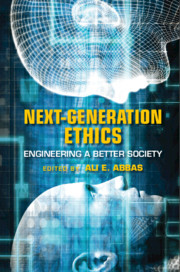Book contents
- Next-Generation Ethics
- Next-Generation Ethics
- Copyright page
- Contents
- Contributors
- Acknowledgment
- 1 Next-Generation Ethics
- 2 Ethical Distinctions for Building Your Ethical Code
- Part I Technology
- Part II Business Enterprises
- Part III Engineering
- Part IV Society
- 21 Topics in Next-Generation Ethics
- 22 Techno Innovations: The Role of Ethical Standards, Law and Regulation, and the Public Interest
- 23 Evolutionary Ethics: A Potentially Helpful Framework in Engineering a Better Society
- 24 Topics in Next-Generation Medical Ethics
- 25 Next-Generation Ethical Development of Medical Devices
- 26 Looking Back to Go Forward: The Ethics of Journalism in a Social Media Age
- 27 Social Media Ethics 2.0
- 28 Artificial Intelligence, People, and Society
- 29 Ethics in Cyberspace: Freedom, Rights, and Cybersecurity
- 30 Next-Generation Religion and Ethics
- Index
- References
22 - Techno Innovations: The Role of Ethical Standards, Law and Regulation, and the Public Interest
from Part IV - Society
Published online by Cambridge University Press: 18 October 2019
- Next-Generation Ethics
- Next-Generation Ethics
- Copyright page
- Contents
- Contributors
- Acknowledgment
- 1 Next-Generation Ethics
- 2 Ethical Distinctions for Building Your Ethical Code
- Part I Technology
- Part II Business Enterprises
- Part III Engineering
- Part IV Society
- 21 Topics in Next-Generation Ethics
- 22 Techno Innovations: The Role of Ethical Standards, Law and Regulation, and the Public Interest
- 23 Evolutionary Ethics: A Potentially Helpful Framework in Engineering a Better Society
- 24 Topics in Next-Generation Medical Ethics
- 25 Next-Generation Ethical Development of Medical Devices
- 26 Looking Back to Go Forward: The Ethics of Journalism in a Social Media Age
- 27 Social Media Ethics 2.0
- 28 Artificial Intelligence, People, and Society
- 29 Ethics in Cyberspace: Freedom, Rights, and Cybersecurity
- 30 Next-Generation Religion and Ethics
- Index
- References
Summary
Twenty-first-century innovations in the technical fields designed for human consumption and ultimately as daily life necessities such as personal robots, intelligent implants, driverless cars, and drones require innovations in ethical standards, laws and, rules of ethics. Ethical issues around robots and artificial (AI) intelligence, for example, present a new set of challenges about the new capabilities they afford. These capabilities outpace law and policy in ethics. Tesla and Space X CEO Elon Musk recently warned the governors of the United States that “robots will do everything better than us” and that “AI is a fundamental existential risk for human civilization.” He called for the proactive government regulation of AI, “I think by the time we are reactive in AI regulation, it’s too late” (Domonoske, 2017)
- Type
- Chapter
- Information
- Next-Generation EthicsEngineering a Better Society, pp. 328 - 342Publisher: Cambridge University PressPrint publication year: 2019



